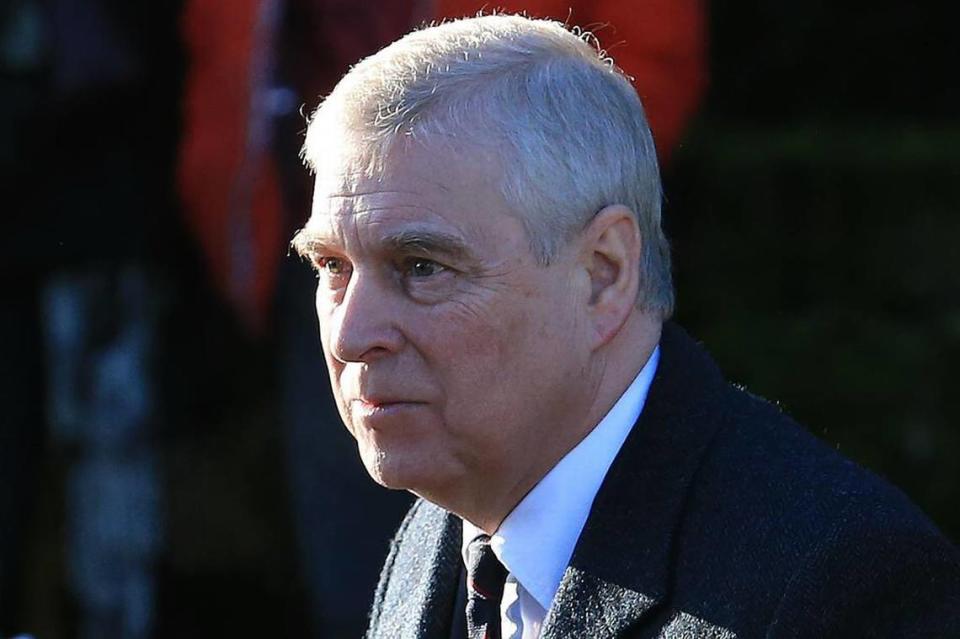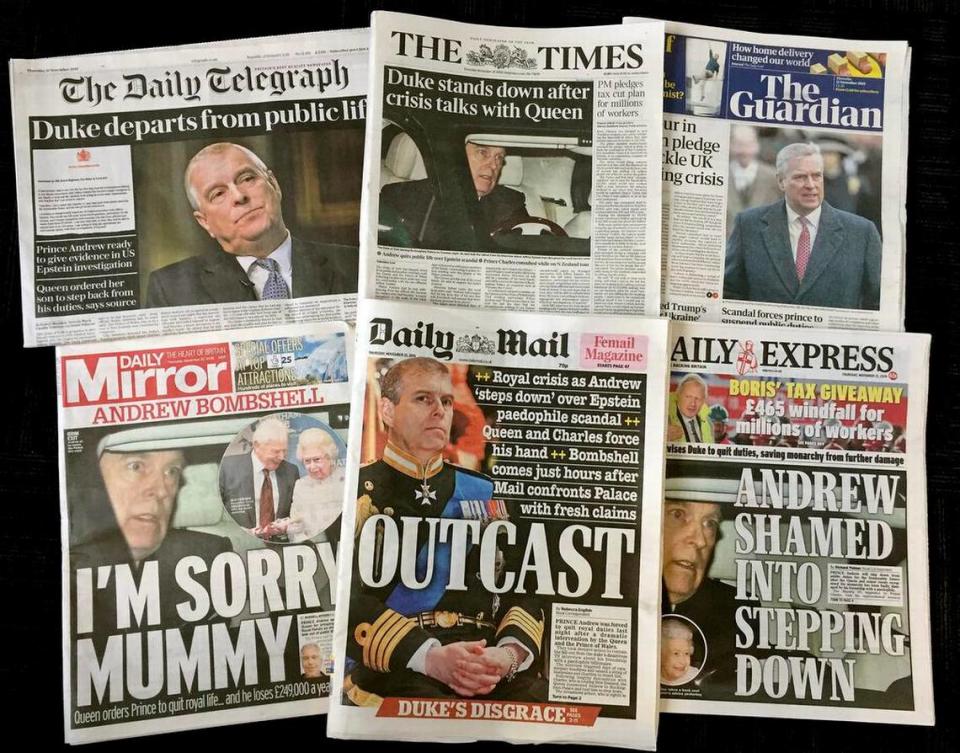Tea and sympathy: How Britain is watching the Ghislaine Maxwell spectacle
The image that captures the Jeffrey Epstein scandal here in Britain is one that doesn’t include the financier-turned-sex-offender at all.
Instead the picture shows a young teenager, Virginia Roberts, with the Queen’s favorite son, Prince Andrew. And beside him stands Ghislaine Maxwell.
The notorious photograph was taken in 2001 at Maxwell’s townhouse in Belgravia, one of London’s poshest neighborhoods. It was here that Virginia Roberts (now Giuffre) claims she was trafficked and pressured by Maxwell and Epstein to have sex with Prince Andrew.
The Prince categorically denies this ever happened. In an equally infamous interview with the BBC’s “Newsnight” program, he claimed he couldn’t have been at Maxwell’s London home that night, because he was at a chain pizza restaurant with his daughter.
But the Prince’s longstanding association with Epstein and his “friend” Ghislaine Maxwell has trashed his reputation, and dragged the royal family into a scandal that seems to worsen by the day.
Now Maxwell herself is standing trial in a New York court, and interest in the case is at fever pitch. She vociferously denies all the claims against her. Giuffre’s allegations are not part of the case.
The British press — including Channel 4/ITN — has covered every twist and turn of the story: Epstein’s mysterious suicide in a New York jail; Maxwell’s subsequent disappearance and her dramatic arrest at a luxury hideaway in New Hampshire; and for the last 16 months, her incarceration at the Metropolitan Detention Center in New York.

The fascination with the Maxwell family stretches back more than three decades. Her father, Robert, was a notorious press baron, a real life Logan Roy of the HBO series “Succession.” His dramatic death in 1989 — he was found floating naked in the Atlantic, purportedly after falling off the yacht named after his daughter — was a big story.
It became bigger still when it emerged Maxwell had illegally raided the pension fund of his collapsing newspaper group, to the tune of hundreds of millions of pounds. Her brothers were arrested and tried for conspiracy to defraud, but were acquitted at trial.
Ghislaine Maxwell’s early life bears all the hallmarks of extreme privilege, British-style. The mansion in the English countryside. Expensive private schools, and a decadent youth as a student at Oxford. The glamorous parties and ball gowns, the cosmopolitan chic. A contacts book bulging with the great, the good and the very rich and famous.
The British public was shocked and horrified when the scale of Epstein’s crimes were revealed by the Miami Herald’s ground-breaking investigation. Maxwell’s alleged involvement and her subsequent disappearance gave the impression of a fugitive on the run from the law.
The judge, the lawyers and Ghislaine Maxwell: a scorecard for watching the trial in New York
But as the trial drew closer, a concerted effort took place to tell a different story: that Ghislaine Maxwell is being scapegoated for Epstein’s crimes and mistreated by the U.S. authorities.
A photograph of a bedraggled, bruised Ghislaine was splashed over the newspapers. Her claim of “assault and abuse” at the hands of prison officers has been given blanket coverage.

Her claims that she was fed maggot-infested apples in a rat-ridden cell while repeatedly being denied bail has led to something approaching outrage in various quarters.
Writing in the Daily Mail, columnist Sarah Vine described Maxwell’s treatment as inhumane.
“Malnutrition, assault, threats, abuse — and a seemingly unrelenting campaign designed to wear her down mentally and physically.
“Her eyesight is failing, she is losing her hair and shed a dangerous amount of weight. She has been, to all intents and purposes, treated like a convicted criminal. Indeed, some might argue worse than a convicted criminal — certainly by British standards.”
The message has been hammered home by Maxwell’s supporters. Most prominent among them is her brother Ian, who has been running a campaign to highlight his sister’s apparent innocence. Just this week he was given top billing in an interview on the BBC’s respected “World at One” radio show.
He claimed that his sister could not receive a fair trial in the United States because the negative coverage in the media had already “poisoned” the jury against her.
“It is an abuse of human rights and an abuse of the due process that has taken place,” he said.
“One thing you can say is there’s been an awful lot of talking by everybody for the last few years and the voice of Ghislaine has never been heard…The treatment meted out to Ghislaine has been appalling.”
Ian Maxwell’s campaign has set up a website, realghislaine.com. Its banner reads “Ghislaine Maxwell is innocent”. Articles critical of her treatment are prominently displayed. One, carried in the Telegraph, claims Maxwell’s prison treatment is “worse than a terrorist on Death Row.”
Would someone without the wealth and privilege of Ghislaine Maxwell have received such a sympathetic hearing? Especially given that there are multiple allegations of serious crimes leveled against Epstein and Maxwell here in the UK.
Last June, the investigations team at Channel 4/ITN News revealed how at least half a dozen women had claimed they were targeted, groomed, trafficked or sexually abused by Epstein in Britain.
Leading legal experts, including one of Britain’s most prominent former prosecutors, told the program that the evidence provided strong grounds for a proper police investigation. But no such investigation has taken place.
In response, the Metropolitan Police, Britain’s largest police force, said it would “review” its decision not to investigate.
A further “review” was announced in August, after Virginia Giuffre filed a civil case in New York alleging sexual assault by Prince Andrew.
But just months later, both reviews were dropped.
This was even more remarkable, given that one of the victims in the Ghislaine Maxwell case alleges she was groomed by the heiress for sexual abuse in London between 1994 and 1997.
There were claims that Maxwell had targeted other young girls in the UK too.
Police have also revealed that two further British victims had come forward to allege they had been sexually abused by Epstein in Britain. We understand multiple British women have made claims to the compensation fund set up to compensate the victims by the Epstein estate after his death.
Scotland Yard (as the Metropolitan Police is known) insist that its decision not to investigate the scandal has nothing to do with the alleged involvement of the Queen’s favorite son.
Or that it might pose awkward questions for its own force whose members provided Prince Andrew’s security detail, and traveled with him to the Epstein mansion in New York and his Caribbean hideaway.
But the failure even to investigate means we are unlikely to ascertain whether crimes were committed on British soil.
Critics fear the apparent police reticence on this reflects broader concerns about the shortcomings of a criminal justice system consistently accused of letting down the victims of sexual crimes.
So it will fall to a U.S. Jury in a New York court to uphold the principles of justice and decide whether Ghislaine Maxwell is innocent or guilty. And to a U.S. civil court to decide if Prince Andrew himself has a case to answer.
Cathy Newman is an anchor with Channel 4/ITN News in the UK

 Yahoo Movies
Yahoo Movies 
